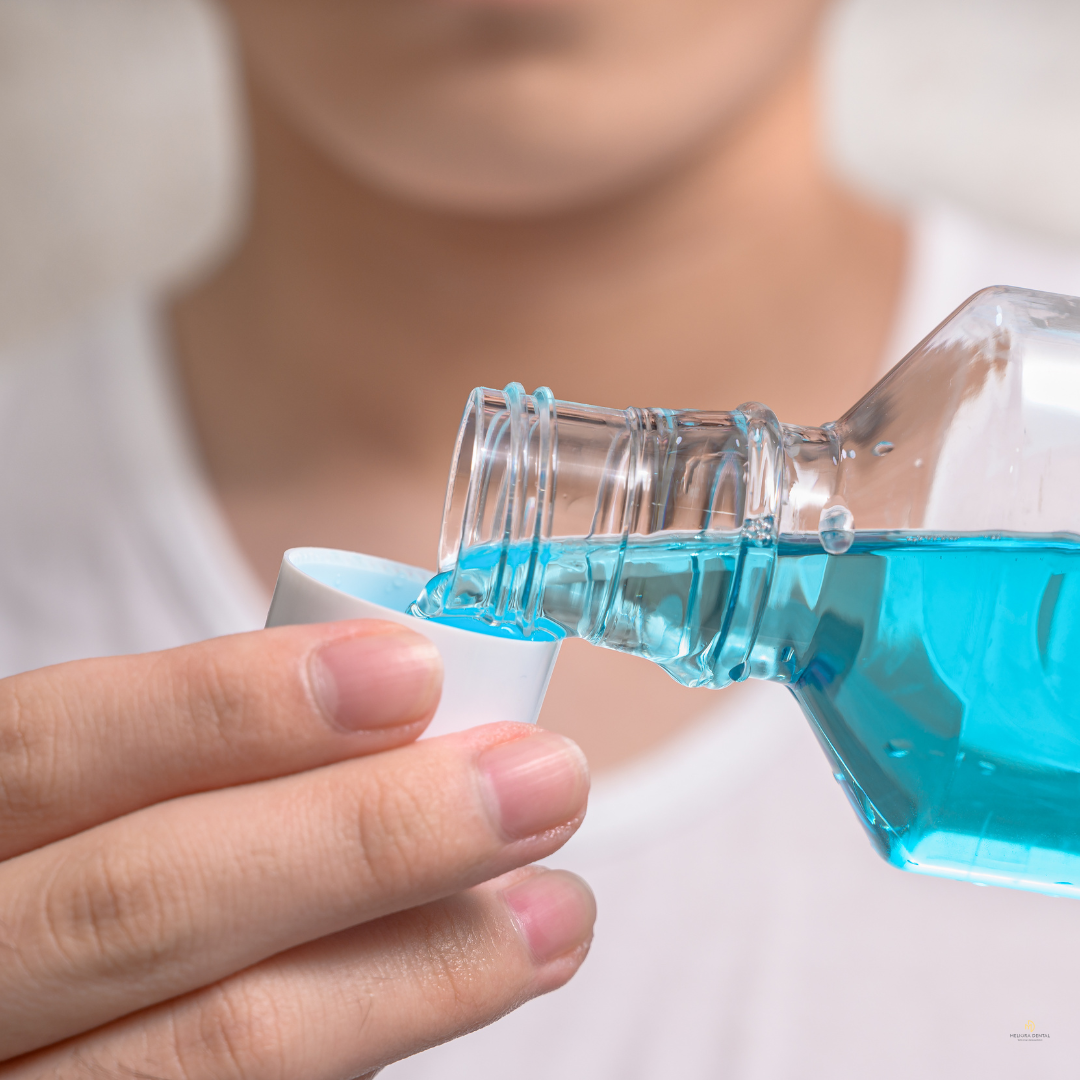One of the questions we are asked most by patients is “Does it matter which mouthwash I use?” A great question, especially as there are countless to choose from (it can feel a bit overwhelming, especially if you’re not a dentist!)
Your oral hygiene status will play a big part in what type of mouthwash you should use. Someone with tooth sensitivity will need different things from their mouthwash compared to someone with gingivitis, or a dry mouth (for example). Meanwhile, children generally don’t need mouthwash, unless they have a condition requiring a prescription.
Let’s take a look at a variety of dental conditions and give you an idea of the type of mouthwash needed for each.
Bad breath
Bad breath (clinical name, halitosis) can range from chronic and severe, to short-lived and minor. Even minor bad breath can be enough to leave you feeling self-conscious, and in many cases, cosmetic mouthwash is enough to address the cause. This could simply be down to the accumulation of pungent bacteria on your tongue as a result of eating odorous foods.
Persistent bad breath may be your body trying to tell you there is significant bacteria build up in your mouth, or that you are suffering from gingivitis (the early stages of gum disease) or periodontitis (advanced gum disease).
Antibacterial mouthwash may be needed to address these conditions, and these can be prescribed by a dentist or hygienist. These are to be used on a temporary basis.

Dry mouth
Dry mouth (clinical name xerostomia) is a condition estimated to affect approximately 20% of the population. You should avoid mouthwash containing alcohol, which will only exacerbate the condition (alcohol decreases the flow of saliva).
If you have a particularly severe dry mouth, you should eliminate alcohol from your diet entirely and sip on plenty of water throughout the day. Rinsing your mouth with water after consuming foods that dry out the mouth is also recommended (alongside your alcoholic mouthwash).
Gum disease
Everyone should be looking to prevent gum disease, and if you’re brushing and flossing twice daily, you’re doing great (well done!) You can bolster this effort by using an anti-plaque or antibacterial mouthwash, which can also be used for minor cases of gum disease (gingivitis).
If your dentist finds that you have high risk factors for gum disease, or that you are actually suffering from it, they may prescribe a special mouthwash containing chlorhexidine. This disinfectant and antiseptic mouthwash is proven to help reduce gum disease. Remember though, it isn’t a substitute for brushing and flossing, but a supplementary helping hand to curb the condition.
Corsodyl is the main leader amongst mouthwash for gum disease, but it is for short-term use only. If you have persistent symptoms of gum disease that don’t improve with a good oral hygiene routine (including using mouthwash such as Corsodyl), you should see a hygienist for a gum examination.
Tooth sensitivity
Tooth sensitivity is a common condition, and most people will be familiar with it (particularly after consuming hot and cold foods). If you have tooth sensitivity that lingers, this could indicate that you are suffering from enamel erosion. This is when your enamel starts to wear thin, usually as a result of eating an acidic diet.
To combat this, there are mouthwashes (and toothpastes) that can help strengthen your enamel, and. the weaker dentin underneath. The ingredients to look for include potassium citrate, potassium nitrate, calcium phosphate, and fluoride.
Protective mouthwash
You don’t necessarily have to be suffering from an active dental issue to use mouthwash. Fluoride mouthwashes can be used continuously to fortify your teeth against cavities and gum disease. Fluoride is a known ingredient for preventing cavities (dentists swear by it!)
Children should not have mouthwash if they’re under the age of 6, as their teeth are still forming and susceptible to fluorosis. Whilst fluorosis isn’t a serious health condition, it can alter the appearance of teeth, changing their texture and shade. Mouthwash containing alcohol (or prescription mouthwash) should also not be given to children.
Make sure you keep mouthwash out of the reach of children.
Older children may benefit from cosmetic mouthwash for fresher breath (common amongst teenagers). However, the main focus should be on making sure children brush twice a day, and get into the habit of flossing at least once a day (which can be a challenge in itself!)
Gum care is something we do best here at Meliora Dental. We can provide tailored advice on flossing and brushing techniques, diagnose your gum disease risk, and help you prevent it.
Avoiding gum disease (the leading reason for tooth loss in adults) is easier than you think. Simply coming along to routine hygienist visits can reduce your risk of gum disease dramatically.
Contact our reception team for prevention-orientated treatment from an oral hygiene-focused team.
BACK TO BLOG
